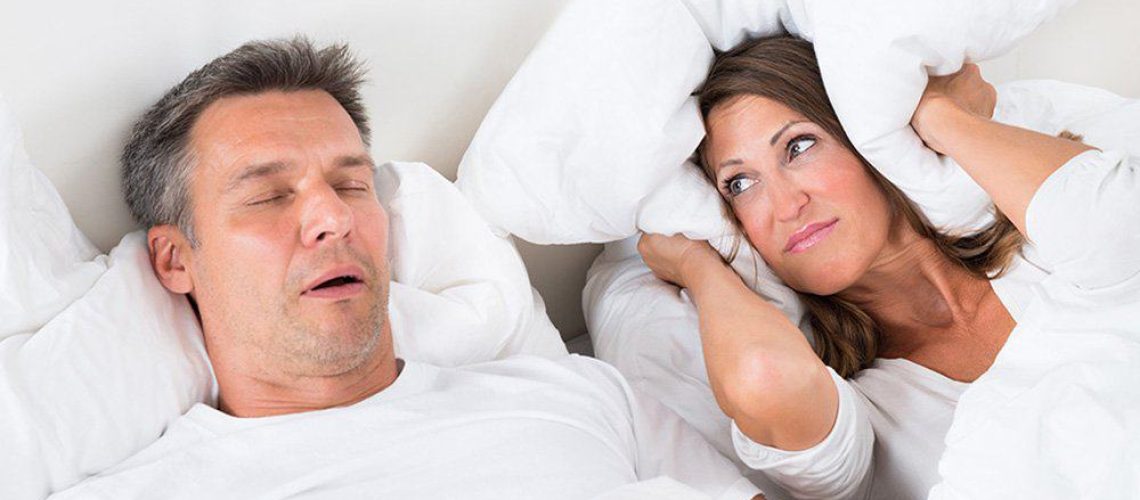With the recent surge of #Wellness, many people are taking a deeper look at many facets of their health and how they can improve upon it. One such aspect of life that health professionals are paying more attention to is sleep. And with this focused awareness, most of the public is realizing how little good quality sleep we are actually getting. Whether it’s due to stress, too much caffeine or sleep apnea, over 35% of Americans are not getting the recommended 7 hours of sleep on a regular basis. In addition to not getting enough sleep, many people who are getting the recommended seven hours of sleep or more, report low-quality sleep or waking up feeling groggy and unrefreshed along with other health issues. If you fall into either of these categories, it may be time to get tested for sleep apnea. Sleep apnea is an often undiagnosed sleep condition that can cause an onslaught of physical and mental issues which could result in a lower quality of life and is potentially life-threatening.
If you’ve noticed a decline in the quality of your sleep or have noticed a drop in overall energy and more mood swings coupled with deteriorating physical health, you may unknowingly be suffering from sleep apnea. This article explains four things you should know about sleep apnea as well as, what to do if you believe you or a loved one is experiencing this condition.
Comfort Sleep Solutions aims to diagnose and then treat all forms of sleep apnea in Idaho Falls. Call us today to schedule a free consultation. We aim to help increase your quality of sleep so that you can reach your overall health and wellness goals.
There Are Different Types of Sleep Apnea
When we consider sleep apnea, most people think about OSA or obstructive sleep apnea, however, there are two other types of sleep apnea, central sleep apnea, and complex sleep apnea syndrome. These three forms of sleep apnea can be explained as follows:
- Obstructive Sleep Apnea – This condition occurs when the muscles in the throat become “obstructed” or blocked during sleep.
- Central Sleep Apnea – Central sleep apnea occurs when the brain doesn’t send the correct signals to the muscles that control your breathing.
- Complex Sleep Apnea Syndrome – The most serious form of sleep apnea, this condition occurs when a person suffers from both obstructive and central sleep apnea.
There Is A Broad Range of Sleep Apnea Symptoms

One of the reasons that sleep apnea is often underdiagnosed is because of the wide range of sleep apnea symptoms in Idaho Falls. Additionally, these symptoms overlap with many other conditions such as depression, anxiety, adrenal fatigue, common cold (due to the sore throat that can come from OSA), etc. Some other symptoms of sleep apnea in Idaho Falls a person may experience from sleep apnea include, but are not limited to:
- Loud snoring
- Choking or gasping during sleep
- Restless sleep
- Daytime fatigue, trouble concentrating
- Insomnia
- Mood swings
- Decreased libido
- Memory loss
Overweight Males Are Not The Only People At Risk For Sleep Apnea
While statistically speaking, overweight males are more at risk for both central and obstructive sleep apnea. This fact doesn’t rule out other groups of people that could be impacted by this life-threatening condition. In fact, after menopause, women are just as likely to be affected by sleep apnea as men. Other risk factors that may cause sleep apnea include:
- Obesity – Excess weight and fat around the neck can cause the throat to be obstructed during sleep.
- Having a large neck circumference
- Family History
- A narrow airway (genetic)
- Using alcohol, sedatives or tranquilizers
- Smoking
- Nasal Congestion
- Being Older
- Heart Disorders
- Having a Stroke
There Are Many Treatment Options Available

From lifestyle changes, oral appliances, CPAP machines, and even surgery there is a multitude of different Idaho Falls sleep apnea treatment options available. Before embarking on a treatment plan, contact Comfort Sleep Solutions to schedule a consultation and have a sleep study performed. From this information, our sleep apnea specialists will be able to determine the correct treatment plan for your sleep apnea in Idaho Falls.
Prior to your appointment, you may wish to take these sleep apnea self-assessments. Record your answers if you do, this information will help us create a specific treatment plan based on your lifestyle and symptoms.






